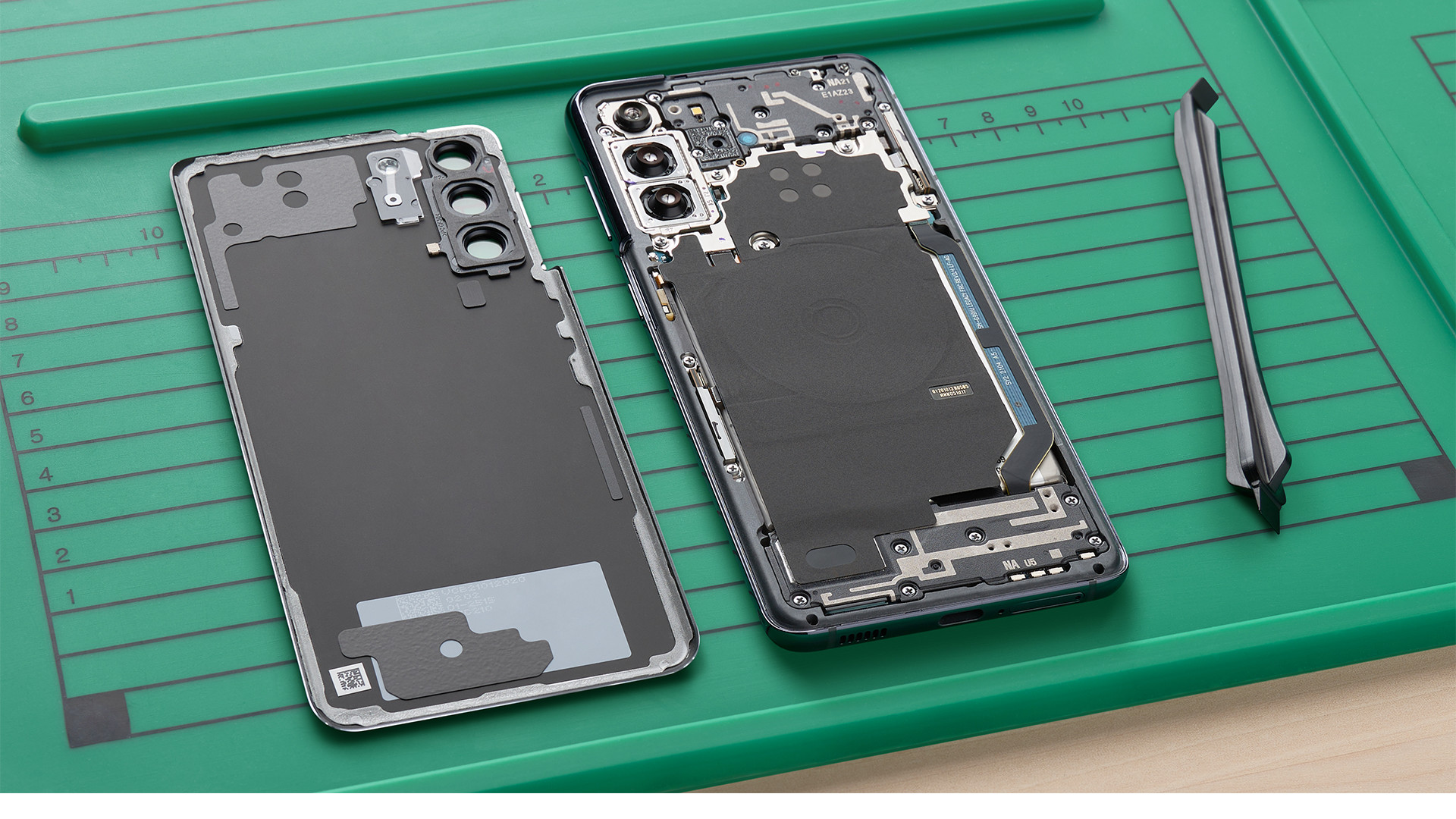Samsung's self-repair program has finally launched - but there are limits
Limited to the Galaxy S20, S21, and Tab S7 Plus tablet

Samsung and iFixit have finally launched their self-repair program, allowing owners of a phone from the Galaxy S20 and S21 lines as well as the Tab S7 Plus to buy replacement parts.
The initial announcement of the self-repair program was made back in late March, and not much has changed since. Across the three product lines, you’ll be able to purchase repair kits for the screen and battery, charging port, and back glass; standalone batteries are not included. What's new is access to free online repair guides that tell you how to fix the phone via step-by-step guidance that includes images.
Repair packages
Both the replacement parts and the step-by-step instructions are available on the iFixit website.
You start by going to iFixit’s Galaxy page and selecting the model. Prices between the S20 and S21 lines are mostly uniform. Charging port replacement costs $66.99. Back glass kits will run you $76.99 except for the base S21 model which is $66.99. The display and battery kits fluctuate depending on the phone. The cheapest is, again, the base S21 ($167.99) with the most expensive being the S21 Ultra ($239.99).
Prices are a little different for the Galaxy Tab S7 Plus tablet. The display kit will run you $226.99, back glass and battery assembly is $86.99, and the charging port is $66.99. Aside from product-specific parts, each repair kit comes with the same tools: suction handles, iFixit Opening Tool, tweezers, and a bit driver just to name a few.
Each of the repair kits also comes with a free return label so you can ship the old parts back to Samsung for proper disposal. iFixit even includes instructions on how to properly dispose of lithium-ion batteries. You can’t just throw these batteries into the trash as they can literally explode. We should also mention that some repair kits, like the S21 5G Screen and Battery package, are limited to seven per customer.
Step-by-step
As for the step-by-step instructions, Samsung has a handy landing page for quick access. By iFixit’s own admission, repairs can be a little tough to do. The Galaxy S21 Ultra Screen and Battery replacement page, for example, is listed as moderately difficult and may take you a couple hours to complete. Repair involves using one of the picks and the suction handle to pry open a phone and disconnecting certain parts to replace the battery.
Sign up for breaking news, reviews, opinion, top tech deals, and more.
Instructions show everything in minute detail, but if you don’t feel confident in doing it yourself, Samsung has other options. You can use Samsung's store locator to find an authorized fix-it shop or mail the phone in.
Just don’t forget to put your phone into Repair Mode to protect your data before you bring it in.
Limited in scale
The limited amount of devices that you can fix is a little disappointing. It would have been nice to have Samsung’s latest flagship phone, the Galaxy S22, in the program. The announcement does state there are plans to include more devices, but no date has been given.
We reached out to Samsung to ask when more devices will be added as well as if it will be possible to buy a replacement battery separate from display kits. A Samsung representative got back to us, but had no new information to give. The only way to get a new battery is to purchase the display kit for now. The company did reveal that “additional parts will be added as the program ramps up,” but didn’t point to anything specific or exactly when.
Even so, it’s great to have those repair options. Samsung has finally joined the likes of Google and Apple in offering repairs for their phones. Even Valve is doing the same with Steam Deck. These are all major wins for the consumers and the environment.
For iPhone owners, we recommend checking out our Apple Self Service Repair story for details about its program.

Cesar Cadenas has been writing about the tech industry for several years now specializing in consumer electronics, entertainment devices, Windows, and the gaming industry. But he’s also passionate about smartphones, GPUs, and cybersecurity.